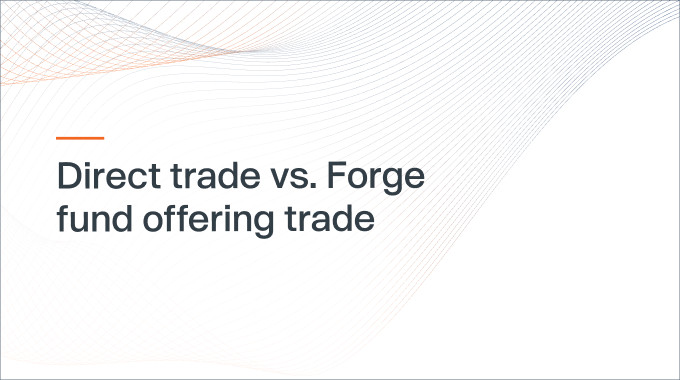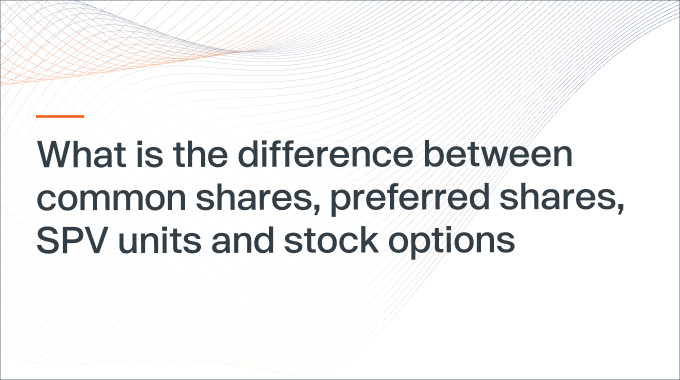Investing in private company shares: A guide for new investors
Investing in private company shares: A guide for new investors
Have you ever wished that you could have invested in a high-growth company like Facebook, Coinbase or Google before it went public? You’re not alone—and now, the opportunity to invest in unicorn pre-IPO companies is greater than ever. In fact, over the past few decades, private market investing has grown significantly, as more people recognize the value of investing in companies earlier in their lifecycle.
At Forge, our mission is to give a broader group of people the ability to buy and sell private company shares in some of the world’s most innovative companies. In doing so, we endeavor to build the infrastructure, technology and data solutions that power the future of the private market. In this guide, we’ll break down how private company investments work, who can invest, what to expect as a new private market investor and how you can get started investing with Forge.
What are private company shares?
Private company shares represent ownership in a business that has not yet gone public and is not listed on a public stock exchange. These shares are typically held by founders, employees and early investors, and are often issued during fundraising rounds to support the company’s growth.
Unlike public stocks, private shares are not freely traded and are generally less liquid—but they offer investors the opportunity to get in early, before a company reaches the public market. At Forge, we help investors access these shares through our trusted secondary marketplace, providing a potential gateway to some of the world’s most innovative and fast-growing private companies. Investing early in these companies can potentially mean skipping public market premiums and capturing long-term upside potential.
The benefits of investing in private companies
Investing in private companies offers a range of potential benefits, including:
- Early access to high-growth companies
- Potential for outsized returns before an IPO
- Portfolio diversification across industries
- Strategic, earlier-stage involvement and potential voting rights
Understanding private company share types: Common share vs. preferred shares
When investing in private companies, it’s important to understand the different types of share ownership available. The two most common types of private company equity are common shares and preferred shares, each offering distinct rights, benefits and considerations for investors.
Common shares
Common shares are typically the foundational equity issued by private companies and represent proportional ownership in the business. Founders, employees and early-stage investors often hold common shares. Owners of common shares usually have voting rights, which allow them to influence key corporate decisions such as electing board members or approving mergers and acquisitions. In a successful exit—such as an acquisition or IPO—holders of common shares can benefit from potential substantial appreciation if the company has grown significantly since their investment.
Preferred shares
Preferred shares, on the other hand, are more commonly issued to institutional investors or venture capitalists . These shares typically offer priority rights over common shares when it comes to dividends and distribution of proceeds in the event of a liquidity event like a sale or liquidation. Preferred shareholders may also receive fixed dividends and often benefit from additional investor protections such as anti-dilution clauses or liquidation preferences, which ensure they are first in line to recoup their investment. Preferred shares often hold specific voting rights as well; for example, the holders of preferred stock often have the ability to elect one or more members of a company’s board of directors and the power to veto certain significant corporate actions, such as incurring significant debt, entering into material commercial contracts, or changing the company’s line of business.
Some investors may hold a combination of both types of shares, depending on the stage of the company and the terms negotiated at the time of investment. Understanding the differences between share types is key to building a well-informed private market investment strategy.
How private company valuations work
Unlike public companies, there’s no ticker symbol or real-time market price to reference for public companies. Instead, private company valuations are determined by a combination of data points, investor sentiment and market activity. For investors and shareholders alike, understanding how these valuations are set is essential for making informed decisions.
One of the most influential drivers of a private company’s valuation is its most recent funding round. When a company raises capital from institutional investors, the price per share agreed upon during that round often sets the benchmark for its overall valuation. This valuation reflects how venture capitalists or private equity firms view the company’s growth potential, business model and market opportunity at that time.
Another critical factor is the 409A valuation, a third-party, independent appraisal used to determine the fair market value (FMV) of a private company’s common stock. These valuations are required for setting stock option exercise prices and are typically updated at least annually or after material events, such as a new funding round. Unlike fundraising valuations—which can be influenced by negotiation and market hype—409A valuations are designed to provide a more conservative, compliance-driven assessment of value.
Finally, secondary market activity offers an increasingly important lens into private company pricing. At Forge, we provide a marketplace where buyers and sellers of private shares can transact. The prices negotiated on our platform—and the demand we see for specific companies—can serve as real-time indicators of a company’s perceived market value. For investors, these insights can be invaluable for assessing fair pricing and timing investment decisions.
What’s more, Forge has created Forge Price™—a derived pricing dataset designed to provide an up-to-date, indicative view of price performance for approximately 200 venture-backed, pre-IPO companies. Using a robust methodology that incorporates recent funding round data, secondary market activity and indications of interest, Forge Price™ offers a unique window into private company valuations—insights that have traditionally been hard to access or interpret.
Private company investment risks and considerations
Investing in the private market comes with a unique set of risks and considerations that are important to understand before getting started. Unlike publicly traded shares, private shares are not listed on stock exchanges, making them subject to limited regulatory oversight, less liquid, less transparent and more difficult to value.
Liquidity is a key concern in the private market. Private companies often have the right to prohibit any trading of their shares entirely. Even if trading of the company’s shares are permitted, trades are also typically subject to a right of first refusal (ROFR) held by either the company or significant stockholders; a ROFR means that in any proposed sale, the company or the significant stockholder can step in as the purchaser after exercising their ROFR within a certain time period (typically between 15-60 days). Unlike public markets, where investors can buy or sell shares in seconds, private market investments also may require holding periods of several years—or longer—before a liquidity event such as an acquisition or IPO provides a path to cash out. Secondary markets like Forge help address this challenge by connecting buyers and sellers, but it’s still important for investors to be prepared for a longer investment horizon and take heed of the fact that private share transactions often take a longer amount of time compared to public securities.
Higher risk of potential failure. While both private and public companies face the risk of failure, private companies generally experience a higher failure rate. This is often attributed to limited access to capital, as private companies rely on a smaller pool of investors compared to public companies, which can raise capital through stock offerings. In addition, private companies may have less access to diverse expertise and resources, and potentially face challenges in attracting and retaining top talent compared to public companies that can offer stock options and greater visibility.
Valuation and pricing can also be more complex. Without a daily market price, private shares are typically valued based on recent funding rounds, 409A valuations or secondary market transactions. This means prices may not always reflect real-time changes in a company’s performance or risk profile. Investors should be aware that valuations can fluctuate significantly and may be impacted by broader market conditions or internal company developments.
Transparency can be limited in the private market compared to public companies, which are required to disclose financials, risk factors, and strategic plans. Private companies are under no such obligation. As a result, investors may have less access to detailed or current information, making it harder to fully evaluate the health and prospects of a business.
Accreditation requirements add another layer of consideration. Because of the higher risk and complexity involved, private market investing is generally limited to accredited investors—those who meet specific income or net worth thresholds. These guidelines are designed to ensure participants can absorb potential losses and understand the nuances of investing in a less regulated environment.1
At Forge, we help investors navigate these risks and considerations with transparency, data and expert support—so you can invest with confidence and clarity in a market built for long-term opportunity.
How to get started with Forge
Here’s how to get started with Forge:
1. Open a Forge account
The very first step in the investment process is to open a Forge account.
2. Verify accredited investor status
Next, to invest in private company shares, you must confirm that you meet the SEC’s definition of an accredited investor. When opening your account, the platform will assess whether you meet the income, net worth, or licensing requirements, which is necessary to have an approved account.
3. Explore opportunities
Once verified, you can browse Forge’s marketplace of available private company shares. From high-growth startups to late-stage unicorns, our platform gives you access to a wide range of sectors and companies. Use filters, data insights and company profiles to discover opportunities that align with your investment goals.
4. Submit buy interest
When you find a company that you’re interested in, the next step is to submit your indication of interest. This tells Forge you’re ready to engage, and our team will begin matching your interest with available shares and sellers. You’ll have the chance to review pricing, share class, and transaction details before moving forward.
5. Review and execute
Once a match is made, you’ll receive subscription documents outlining the terms of the investment. The matching process can take as little as a few days or weeks depending on the demand for the private shares. Our experienced team is here to walk you through the process, answer questions, and ensure a smooth, compliant transaction. After signing, funds are transferred, and the shares are settled—bringing you one step closer to becoming a private market investor.
Ready to take the next step?
The private market is no longer reserved for just institutions and insiders. With Forge, you have the opportunity to step into this powerful and growing segment of the investment landscape—backed by the tools, transparency and support to navigate it with confidence. Whether you're looking to diversify your portfolio, gain exposure to high-growth startups, or invest in innovative companies before they go public, Forge makes it simple to get started. Our platform connects you to curated opportunities, delivers trusted data insights, and supports your journey every step of the way. Ready to explore the future of investing? Open your Forge account today and take your first step into the private market.



